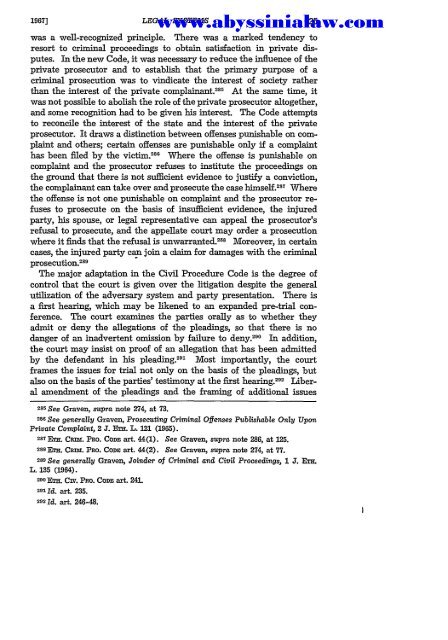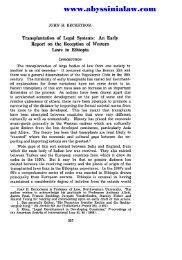You also want an ePaper? Increase the reach of your titles
YUMPU automatically turns print PDFs into web optimized ePapers that Google loves.
19671 LEGAL SYSTEMS<br />
was a well-recognized principle. There was a marked tendency to<br />
resort to criminal proceedings to obtain satisfaction in private disputes.<br />
In the new Code, it was necessary to reduce the influence of the<br />
private prosecutor and to establish that the primary purpose of a<br />
criminal prosecution was to vindicate the interest of society rather<br />
than the interest of the private complainant." 5 At the same time, it<br />
was not possible to abolish the role of the private prosecutor altogether,<br />
and some recognition had to be given his interest. The Code attempts<br />
to reconcile the interest of the state and the interest of the private<br />
prosecutor. It draws a distinction between offenses punishable on complaint<br />
and others; certain offenses are punishable only if a complaint<br />
has been fied by the victim. 2 86 Where the offense is punishable on<br />
complaint and the prosecutor refuses to institute the proceedings on<br />
the ground that there is not sufficient evidence to justify a conviction,<br />
the complainant can take over and prosecute the case himself. 28 7 Where<br />
the offense is not one punishable on complaint and the prosecutor refuses<br />
to prosecute on the basis of insufficient evidence, the injured<br />
party, his spouse, or legal representative can appeal the prosecutor's<br />
refusal to prosecute, and the appellate court may order a prosecution<br />
where it finds that the refusal is unwarranted. 8 Moreover, in certain<br />
cases, the injured party can join a claim for damages with the criminal<br />
2 9<br />
prosecution.<br />
The major adaptation in the Civil Procedure Code is the degree of<br />
control that the court is given over the litigation despite the general<br />
utilization of the adversary system and party presentation. There is<br />
a first hearing, which may be likened to an expanded pre-trial conference.<br />
The court examines the parties orally as to whether they<br />
admit or deny the allegations of the pleadings, so that there is no<br />
danger of an inadvertent omission by failure to deny. 290<br />
In addition,<br />
the court may insist on proof of an allegation that has been admitted<br />
by the defendant in his pleading.21 Most importantly, the court<br />
frames the issues for trial not only on the basis of the pleadings, but<br />
also on the basis of the parties' testimony at the first hearing.292 Liberal<br />
amendment of the pleadings and the framing of additional issues<br />
285 See Graven, supra note 274, at 73.<br />
286<br />
See generally Graven, Prosecuting Criminal Offenses Publishable Only Upon<br />
Private Complaint, 2 J. ETH. L. 121 (1965).<br />
287 ETH. Cm. PRO. CODE art. 44(1). See Graven, supra note 286, at 125.<br />
288 Em. CaM. PRO. CODE art. 44(2). See Graven, supra note 274, at 77.<br />
289 See generally Graven, Joinder of Criminal and Civil Proceedings, 1 J. ETm<br />
L. 135 (1964).<br />
290<br />
Em Civ. PRO. CODE art. 241.<br />
291 Id. art. 235.<br />
292 Id. art. 246-48.<br />
www.abyssinialaw.com





